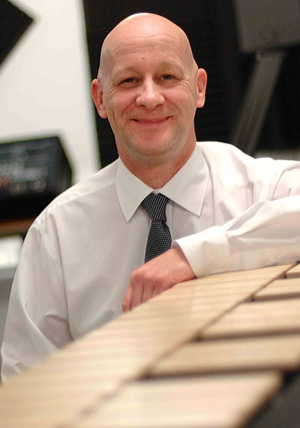Musician sets the standards
Mon, 15 Oct 2012 11:00:00 BST
Pete sets the bar for the next generation of composers and performers
 THE head of University Campus Barnsley has played a key role in creating guidelines to ensure high standards of composing and arranging music in the UK.
THE head of University Campus Barnsley has played a key role in creating guidelines to ensure high standards of composing and arranging music in the UK.
Before moving into the field of Higher Education, Pete Birkby (pictured) had a successful 20-year career as a musician, working as a percussionist with big names such as Dame Shirley Bassey, Frankie Lane, Gene Pitney, Michael Crawford and Andrea Boccelli. He has also long been in demand as a composer and arranger for radio, television, film and the recording studio.
Now Mr Birkby – who runs his own music publishing company – has been one of team of experts taking part in a project to draw up a series of National Occupational Standards for the music industry.
His involvement was the result of long-term membership of the British Association of Songwriters, Authors and Composers (BASCA), which was one of the bodies recruited by the Government-backed organisation Creative and Cultural Skills to draw up new sets of standards for all aspects of the music industry.
“They had already covered music production, recording and industry business standards. Now they were looking for the other side on the industry – composition and performance, which is what I have done most of my life,” said Mr Birkby.
After initial meetings with the other experienced professionals taking part in the project, Mr Birkby took on the task of drafting standards for composing and arranging. The guidelines that he and his colleagues drew up have now been accepted and published as official National Occupational Standards (http://nos.ukces.org.uk) and the aim is that they will be used by employers to write job specifications and set benchmarks of good practice, and by educationalists to develop new qualifications and training.
 Also, it is intended that the standards will help individuals develop their careers in the music industry.
Also, it is intended that the standards will help individuals develop their careers in the music industry.
The compositional and arrangement standards include the requirement to know and understand different musical genres, the capabilities and sounds of chosen instruments and the ability to communicate musical intentions via notation, recording or performance.
University Campus Barnsley has a roster of popular courses in music and music technology, preparing students for a profession which demands the same core skills as ever, despite recent technical developments, says Mr Birkby.
“You still have to be able to perform on the instrument or write music, but the challenge is that technology has made everything more accessible – everyone can compose, produce, record and publish their work with very limited outlay,” says Mr Birkby.
“The problem with that is that not very many people are overseeing all of this. The old-style producer’s role would have included editing and maybe saying to a performer that they could do something a lot better. Now a lot of people can just work on their own and put it out to a worldwide audience, and because of this, quality control might have slipped a little bit.”
Pete Birkby is still a highly-active composer himself, and is currently completing a work for bass guitar and string orchestra.







